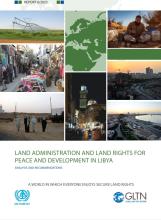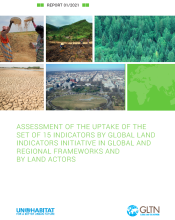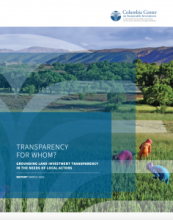Land Library
Welcome to the Land Portal Library. Explore our vast collection of open-access resources (over 74,000) including reports, journal articles, research papers, peer-reviewed publications, legal documents, videos and much more.
/ library resources
Showing items 1 through 9 of 4000.This report is a contribution towards the improvement of land management and land administration in Libya.
To ensure a better and more sustainable future for all, the 2030 Agenda for Sustainable Development (“the 2030 Agenda”) has identified 17 Sustainable Development Goals (SDGs) to be achieved by 2030.
The Global Land Indicators Initiative (GLII) platform was established in 2012 through the joint effort of United Nations Human Settlements Programme (UN-Habitat), the World Bank and Millennium Challenge Corporation with the aim of making global-scale monitoring of land governance a reality by 202
New research by CCSI and the Centre pour l’Environnement et le Développement (CED) on transparency of land-based investment in Cameroon.
In the report, CCSI and CED find that:
Transparency is often seen as a means of improving governance and accountability of investment, but its potential to do so is hindered by vague definitions and failures to focus on the needs of key local actors.
This Handbook provides a comprehensive and systematic overview of the role that Parliamentarians and Parliamentary Advisors can play in the creation of reliable, coherent, and transparent “enabling environments” in the range of areas related to investment in agriculture and food systems.
The Maghreb's oases systems provide a major contribution to the region's food security, economy and natural resources. Despite this potential, oasis ecosystems are threatened by a range of complex factors related to the expansion of agricultural land and increasing scarcity of water resources.
This note proves recommendations for governments, international actors, and mining advocates who seek to optimize the value of green energy mineral reserves, to ensure that expectations for green energy materials do not replace careful planning, impact assessment, and allocation of risks, as well
This technical guide provides strategies on how to strengthen, protect and promote legitimate tenure rights in spatial planning processes at the local, regional and national levels.








